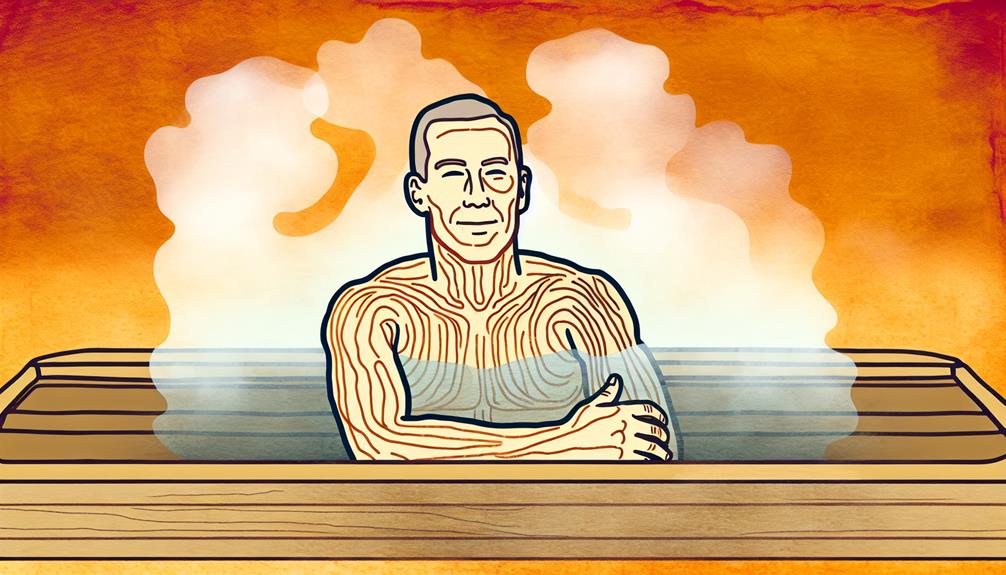Did you know that sauna use has been increasing in popularity, with over 1.8 million saunas in the United States alone?
Many individuals turn to saunas to alleviate muscle soreness, but does it truly help? The relationship between sauna and sore muscles is a topic of interest due to the potential benefits it offers.
So, can stepping into a sauna after a tough workout be the key to soothing those aching muscles? Let's explore the science behind this age-old practice and uncover the truth about its impact on muscle recovery.
Key Takeaways
- Sauna promotes circulation, aiding in muscle recovery and reducing soreness.
- Heat therapy in saunas decreases inflammation, supporting faster recovery after exercise.
- Sauna sessions help reduce muscle stiffness and soreness by increasing blood flow.
- Proper sauna use can alleviate muscle tension, enhance flexibility, and provide temporary relief from discomfort.
Sauna's Impact on Muscle Recovery
Sauna's role in facilitating muscle recovery through enhanced circulation and reduced inflammation is well-supported by research findings. After a strenuous workout, your muscles may feel tight and sore due to the buildup of lactic acid and micro-tears in the muscle fibers. By spending time in a sauna, the heat helps to increase blood flow, delivering essential nutrients and oxygen to your muscles, which aids in faster recovery. The increased circulation also helps to flush out metabolic waste products like lactic acid, reducing muscle soreness and stiffness.
Furthermore, the heat from the sauna can provide temporary relief for muscle pain and tension by promoting relaxation and increasing flexibility. This can be particularly beneficial for athletes and individuals engaging in intense physical activities. Regular sessions in an infrared sauna, known for its deeper heat penetration, can further enhance muscle recovery and reduce the risk of injuries by promoting blood flow and decreasing inflammation in the muscles. Embracing sauna therapy as part of your post-workout routine can significantly contribute to improved muscle recovery and overall physical well-being.
Scientific Evidence Behind Sauna Benefits
When considering the benefits of sauna use for muscle recovery, scientific evidence underscores the effectiveness of heat therapy in promoting circulation and alleviating post-exercise muscle soreness. Saunas can play a crucial role in enhancing blood flow to muscles, which aids in the delivery of essential nutrients and oxygen necessary for muscle repair.
The heat therapy provided by saunas has been shown to reduce muscle pain and stiffness by relaxing the muscles and increasing flexibility. Additionally, sauna therapy can help in decreasing inflammation within the muscles, contributing to a faster recovery process for sore muscles. Studies have supported the positive effects of saunas on muscle soreness, highlighting their potential to assist individuals in managing post-exercise discomfort.
Sauna Vs. Soreness: What Research Shows

Research has demonstrated the potential of sauna therapy in alleviating muscle soreness by enhancing blood flow and promoting relaxation. Sauna therapy can offer temporary relief for muscle pain and stiffness post-workout. The heat from the sauna can improve oxygen-rich blood circulation to the muscles, aiding in muscle recovery.
Additionally, sauna sessions have been shown to help reduce inflammation in muscles, potentially easing soreness and promoting faster recovery. Regular use of the sauna, especially after workouts, may contribute to reducing muscle soreness and improving overall muscle recovery. By increasing blood flow, reducing inflammation, and promoting relaxation, sauna therapy presents itself as a promising aid in managing muscle soreness and enhancing the recovery process.
Whether you're an athlete or a fitness enthusiast, incorporating sauna sessions into your routine could potentially help you recover faster and alleviate muscle discomfort.
Best Practices for Sauna Use
For optimal benefits and safety during sauna sessions, it's essential to follow these recommended best practices.
Hydrate adequately before and after using a sauna to maintain proper fluid balance and prevent dehydration, which can exacerbate muscle soreness. It's crucial to adhere to the recommended durations for sauna sessions to avoid putting excessive stress on your body.
When using a sauna, always sit on a towel to shield your skin from direct contact with the hot surface. Listen to your body's signals and exit the sauna if you feel unwell or uncomfortable.
After your sauna session, take a cool shower to assist in lowering your body temperature and promote quicker recovery. By following these sauna best practices, you can enhance the benefits of heat therapy on muscle relaxation, blood circulation, and overall recovery.
Maximizing Sauna Benefits for Muscles
To maximize the benefits of sauna for your muscles, focus on enhancing blood flow and reducing muscle tension through regular sessions. Here are some key ways to optimize the effects of sauna therapy for muscle soreness and recovery:
- Promote Circulation: Sauna sessions can improve blood flow to your muscles, aiding in the delivery of oxygen and nutrients essential for recovery.
- Reduce Muscle Tension: The heat from the sauna helps relax tight muscles, reducing overall tension and discomfort.
- Enhance Flexibility: Regular sauna use can contribute to increased flexibility in muscles, potentially reducing the risk of injuries.
- Alleviate Inflammation: Sauna therapy may help decrease inflammation in muscles, promoting faster recovery post-exercise.
- Seek Temporary Relief: Utilize sauna sessions for temporary relief from muscle soreness and stiffness, especially beneficial after intense workouts.
Frequently Asked Questions
Is a Sauna Good for Muscle Recovery?
Using a sauna post-workout promotes muscle recovery through heat therapy. It aids in muscle relaxation, enhances blood circulation, and provides recovery benefits. Heat exposure in a sauna can offer pain relief, aiding in quicker muscle recovery.
Is It Good to Go to the Sauna When You Are Sore?
When you're sore, hitting the sauna might sound soothing, but remember, it's not a one-stop fix. Consider mixing it up with ice packs, massages, stretching, or heat therapy for a well-rounded recovery plan.
Is Steam or Sauna Better for Muscle Pain?
For muscle pain relief, steam rooms offer benefits like moist heat therapy. Saunas, especially infrared saunas, excel at muscle relaxation and aiding in post-workout recovery. Heat treatments in saunas are preferred for targeting muscle soreness and promoting muscle recovery.
Is a Hot Bath or Sauna Better for Sore Muscles?
When it comes to soothing sore muscles, a hot bath or sauna can both offer relief. However, the sauna's dry heat can penetrate deeper, aiding muscle recovery by increasing blood flow and reducing tension.
Conclusion
In conclusion, while sauna sessions may offer temporary relief for sore muscles, the scientific evidence supporting their direct impact on reducing muscle soreness is limited.
It's important to stay hydrated, listen to your body, and consider using cold treatments like ice packs for sports-induced soreness.
Remember, when it comes to muscle recovery, it's essential to find the right balance of heat and cold therapy to optimize your results.

Leave a Reply